I was diagnosed with ADHD when I was 19, in December 2016. The point at which it occurred to me that I might have ADHD was when I realised that my exams for the first year of my undergraduate degree were in a couple of weeks time, and that when I glanced at the questions in exam past-papers, I had basically no idea what they meant on account of having read almost none of the relevant material. This was a familiar feeling - a year earlier, during my A-levels, I took a philosophy exam on John Stuart Mill’s On Liberty without having read more than three pages of the (very short) book. In my AS Level Mathematics exam (which you take at 17 years old in the UK), I opened the exam paper to find that I didn’t understand any of the questions because I hadn’t done any work in preparation for the exam. With the philosophy paper, I could blag my way through it on the basis of some knowledge I had from YouTube videos and just chatting with people about philosophy, and I got a B. In maths, I got a U (I’m unsure if you have the mark U in the US or other countries, but you can probably infer roughly how bad it is) - unless you’re a total genius, it’s not really possible to figure out what the above question means if you’ve never encountered most of those symbols before.
So, in 2016 I got an appointment with a psychiatrist, who asked that I take a rather odd examination in which you perform various cognitive tasks while a camera is pointed at your face to see how your eyes move and how you behave. There is always a temptation here to behave in the way you would expect someone with ADHD to behave (“Should I be fidgeting more? Should I dart my eyes around like a madman?”) - I wanted the diagnosis, and I wanted some medication I thought might change my life. I refrained from doing that - not out of a feeling that I was morally obligated to act as I normally do, but because I sort of thought that doing an over the top display of fidgeting was likely to lead to the psychiatrist thinking I was trying to get access to stimulants rather than thinking that I genuinely had ADHD.
I was diagnosed with ADHD, and started off on methylphenidate short-release, commonly known as Ritalin (although it isn’t sold under the brand name Ritalin in the UK). There is one thing worth noting here that I hadn’t heard from other people when discussing Ritalin use: for me, it felt like it did basically nothing that a cup of coffee or two wouldn’t do. My heart-rate was a little faster, and I had a bit less of an appetite, but other than that I didn’t feel like I was concentrating especially more on lectures, reading more papers, or anything else. An odd thing happened though - my grades improved substantially basically immediately after taking Ritalin. Before taking Ritalin, I was averaging a mark of about 63 (a note for non-Brits - in the UK, 63 is a decent but not exceptional score - it is basically the equivalent of getting a B, which in the UK University system is called a 2:1) during the first year of undergraduate degree, and after taking Ritalin I was averaging in the mid 70s (a first-class grade, the highest grade you can get). Despite not feeling that the drug had had any substantial effect, my view now is that it probably (85%) did have some significant effect.
A few years later, during my master’s degree, I was struggling. The work was harder, and had a heavy focus on statistics and quantitative methods that I wasn’t used to. I asked to try a new medication - I went on to Dextroamphetamine (known as Dexedrine), which I have talked about before and which seemed to help a lot. Dextroamphetamine was different to Ritalin - it really felt like it was helping, as opposed to seeming to do basically nothing but probably result in me getting much better grades. I noticed that I was in a zone of concentration that had basically been unavailable to me prior to getting on to Dextroamphetamine. My recommendation here, although hardly an original one, is not that you necessarily try Dextroamphetamine specifically (although this post makes me think that there is some chance it is slightly more effective for most people than Ritalin or Adderall - patients seem to prefer it, at least), but that you shop around a lot and figure out which medication seems to be the most effective for you.
Here are the main problems I have encountered, which have been largely solved by medication:
Strong tendency to procrastinate and leave tasks to the last minute.
Very messy, unable to keep a room tidy or a desk free from clutter.
Unable to read books or concentrate on a film for a sustained amount of time (over, say, 15 to 30 minutes).
Poor impulse control - unable to refrain from drinking alcohol or eating unhealthy food for sustained periods of time.
Forgetfulness caused by unsatisfactory organisation - “I had a job interview scheduled for now?! I don’t remember that at all!”
Here are some tips for people with ADHD that have been immensely helpful for me and I wish I knew earlier:
Use Anki to study for exams - gamifying learning experiences (Duolingo is another good example) seems to work especially well for people with ADHD.
Print out journal articles you have to read (or use a Remarkable tablet) rather than reading them on a laptop, and use a Kindle or other e-reader (or actual books) rather than an iPad for books. Laptops and iPads can be brutal for avoiding distractions.
Most videos and guides that aim to help you avoid procrastination are essentially useless. Don’t bother spending your time watching TED Talks that claim to have solved procrastination - they might be interesting on why we procrastinate, but are mostly unhelpful for actually preventing procrastination.
Get on medication (obviously)!
Try to do your independent tasks/work around other people in a setting conducive to work - it is usually better to agree to go and study with someone in silence than it is to guarantee to yourself that you will do some work at 2pm or whenever.
Pivot your life towards tasks that require active engagement with the work - it is easier to write or to code than it is to read or to watch passively. If you do need to read or watch, try and add some active dynamic by taking notes or something similar.
Your mileage may vary for all of these suggestions, but they all helped me. There is an extent to which I think that everyone would benefit from taking medication that is designed for people with ADHD, and so if you think you may have ADHD I would encourage you to seek a diagnosis and to get medicated. If you want to chat more about ADHD or methods to try and deal with organisational difficulties or whatever, feel free to leave a comment or get in touch with me on Twitter. I’m also actually looking for an accountability buddy at the moment, so if anyone wants to do some Zoom study/job application sessions or anything like that, let me know! Book in a Calendly appointment if you want - during my job-hunting period I’m basically willing to meet anyone and everyone to talk about whatever you want.





Before being diagnosed, what were your struggles with reading like? Since starting treatment, in what ways have these improved? You allude to this in your post, but I’m still curious and wonder whether you’d be willing to share further details.
For context, I *might* have ADHD. One of the things I struggle with most is reading, and this is a source of great frustration and pain for me. To elaborate a bit more: I always want to read (I’m intensely curious about most things), usually like having read, and can often appreciate the aesthetic qualities of good writing *when I’m paying attention*, but more often than not the actual act of reading is a slog. I read slowly, despite feeling an urgency to finish; I have difficulty reading for extended periods of time; I have the temptation, to which I too often succumb, even regarding books I find rewarding, to skim or skip through text; I am often bombarded by far too many thoughts an connections related to the text, and while some of these thoughts are useful, they overall prevent me from focusing adequately on the text; often, I have difficulty holding the coherence of the entire text in mind, so much so that I find myself forgetting key details from earlier parts of the text or otherwise needing to reread the earlier portions several times to get the message; and I often find my head hurts or else I have a tired or spacey feeling when I push myself to read.
Are any of these experiences familiar to you pre-medication? If so, how much has medication helped ameliorate or relieve these issues?